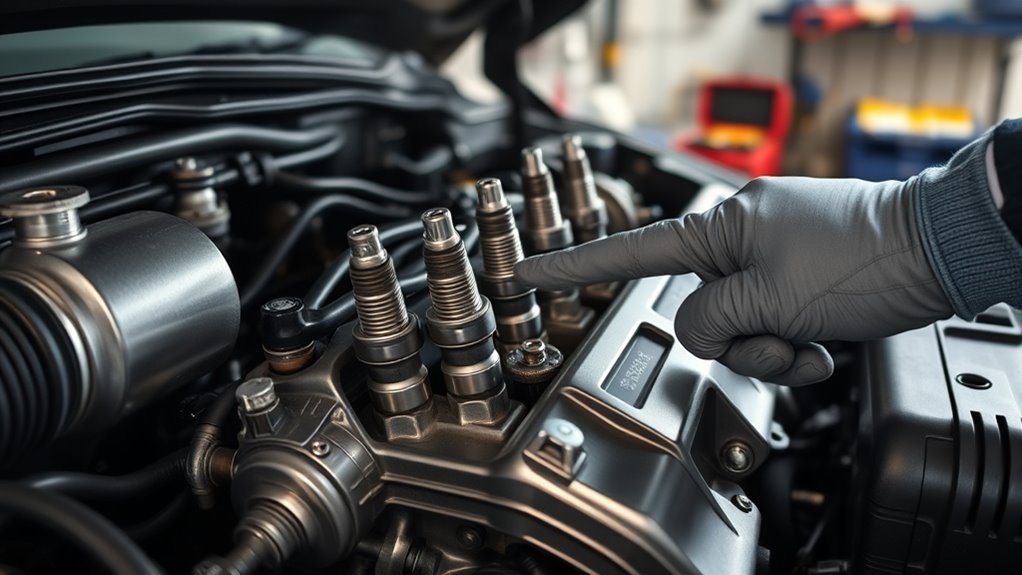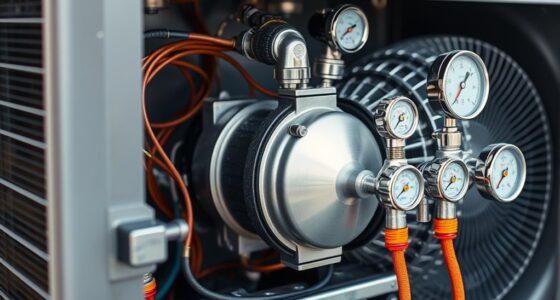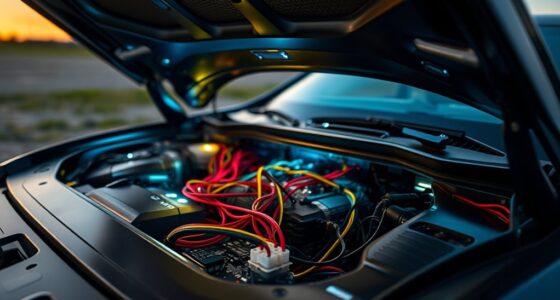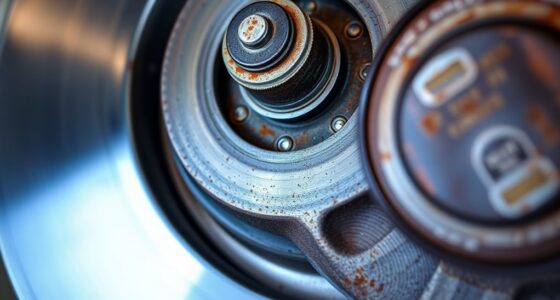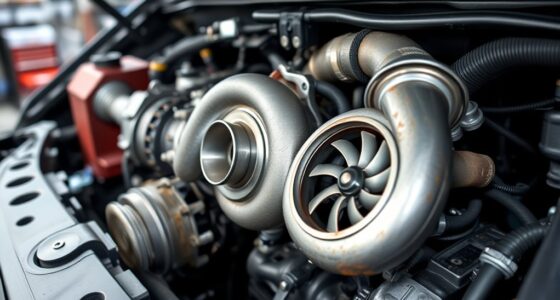If your Ford Transit is misfiring at idle, start by checking the ignition system—test your spark plugs and coils for wear or faults. Then, inspect the fuel injectors and sensors like the oxygen sensor and MAF for proper operation. Also, listen for any signs of internal engine issues such as compression loss or oil on plugs. Addressing these areas can resolve most idle misfires, and exploring these tips further can help you identify the root cause.
Key Takeaways
- Check for diagnostic trouble codes (DTCs) like P030x to identify specific misfire cylinders.
- Inspect ignition coils and spark plugs for wear, fouling, or damage causing weak sparks at idle.
- Test fuel injectors for proper operation and verify fuel pressure to prevent mixture issues.
- Monitor sensor readings (O2, MAF, MAP) for calibration errors affecting combustion quality.
- Conduct compression tests and internal engine inspections to rule out mechanical causes of misfire.
Common Causes of Ford Transit Idle Misfire
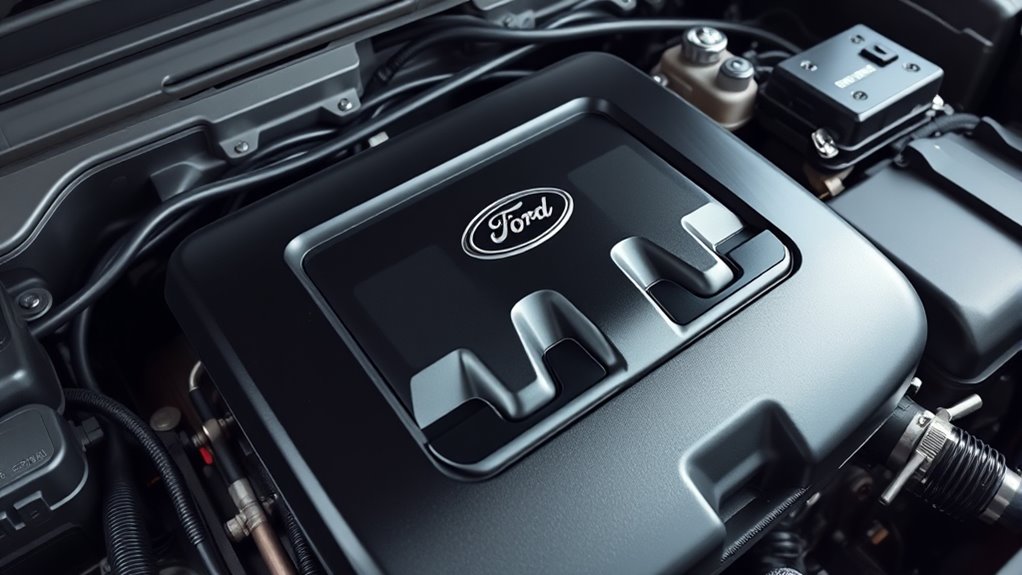
Have you noticed your Ford Transit misfiring at idle? This issue can be frustrating, but understanding the common causes can help you troubleshoot effectively. The first thing to consider is the ignition system. Faulty ignition coils often cause misfires by failing to deliver the proper spark to specific cylinders. If your vehicle has coil-on-plug (COP) systems, you’ll need to test each coil individually to identify the problematic one. Spark plugs contaminated with oil or fuel also cause incomplete combustion, leading to idle misfires. When spark plugs are fouled or worn, replacing them usually restores smoothness to the engine’s idle. Keep in mind that the PCM (Powertrain Control Module) might contribute to misfires if it’s pulling down signals or causing timing issues, so a diagnostic scan can reveal if the control module needs recalibration or replacement.
Fuel system issues are another common culprit. Leaking or stuck fuel injectors can flood cylinders, creating a rich mixture that results in misfires at idle. If fuel trims show negative long-term fuel trims (LTFT), it suggests your engine is compensating for improper fuel delivery or a mixture imbalance. Sometimes, cleaning or repairing injectors isn’t enough, and replacement becomes necessary. Upstream sensors, like oxygen sensors, play an essential role in calibrating fuel mixture, so faulty sensors can cause rough idling or misfires. The PCV valve, which manages crankcase ventilation, can also impact the air-fuel mixture if it’s faulty, leading to idle instability. Additionally, fuel quality can significantly influence engine performance and lead to misfires if contaminants or low octane levels are present. Poor fuel quality can also cause carbon buildup, which affects combustion efficiency.
Internal engine problems shouldn’t be overlooked. When spark plugs have oil on them, it indicates worn valve seals or piston rings, which contribute to misfires. Internal damage such as burned valves or carbon buildup in the combustion chamber can cause persistent idle misfires. Exhaust leaks or turbocharger issues can disturb backpressure and lead to rough running. Compression loss in cylinders directly affects combustion efficiency, producing misfires at idle. Regular mechanical inspections are essential to spot head gasket leaks or timing issues causing these problems. Additionally, compression loss can be caused by internal engine wear or damage, leading to decreased power and idle stability.
Lastly, sensor and ECU diagnostics are essential. Using scan tools or oscilloscopes helps identify if specific cylinders are misfiring and pinpoints faulty sensors. Fault codes like P030x guide you toward affected cylinders. Sensors upstream, such as O2, MAF, or MAP sensors, may need recalibration or replacement to restore proper idle. Sometimes, software updates or module replacements for the PCM are necessary if control signals are compromised. Environmental factors like humidity, weather, and fuel quality can influence sensor performance and fuel combustion, so maintaining your vehicle with regular tune-ups and timely replacements can prevent idle misfire issues. Proper maintenance and timely diagnosis are key to avoiding persistent misfire problems.
Frequently Asked Questions
Can a Faulty Fuel Injector Cause an Idle Misfire?
Yes, a faulty fuel injector can cause an idle misfire. When injectors malfunction, they disrupt the air-fuel mixture, leading to incomplete combustion and cylinder misfires. You might notice rough idling, hesitation, or engine stalling. Leaking or clogged injectors cause inconsistent fuel delivery, which worsens misfire symptoms. Addressing injector issues promptly through cleaning or replacement restores proper engine operation and prevents further damage.
Is a Bad Camshaft Position Sensor Responsible for Idle Misfires?
Yes, a bad camshaft position sensor can cause idle misfires because it provides critical timing data to your engine’s ECU. When the sensor malfunctions, the ECU receives incorrect signals, which disrupts ignition timing and fuel injection. This can lead to rough idling, stalling, or misfires, especially at low speeds. Regularly check and replace a faulty CMP sensor to restore proper engine timing and smooth idle performance.
How Does a Dirty Throttle Body Affect Engine Idle?
A dirty throttle body directly impacts your engine’s idle by disrupting airflow. Dirt and carbon buildup cause turbulent air, making the throttle valve stick or respond slowly. This results in rough idling, unstable RPMs, and frequent stalling. You might notice vibrations or surging. Cleaning the throttle body restores smooth airflow, stabilizes idle, reduces stalling, and improves overall engine performance, giving you a smoother, more reliable ride.
Can Worn Spark Plugs Lead to Ford Transit Misfire at Idle?
Yes, worn spark plugs can cause your Ford Transit to misfire at idle. When plugs are fouled, damaged, or have worn electrodes, they struggle to produce a strong spark, disrupting combustion. This leads to rough idling, hesitation, or stalling. You should inspect your spark plugs regularly, replace them when worn, and guarantee proper gap settings to keep your engine running smoothly and prevent idle misfires.
Are Vacuum Leaks a Common Cause of Idle Misfire?
Yes, vacuum leaks are a notorious culprit behind idle misfires—almost like sneaky little gremlins disrupting your engine’s rhythm! When unmetered air sneaks into your intake, it throws off the air-fuel mix, causing rough idles, stalling, and that frustrating misfire. You’ll notice hissing sounds, fluctuating RPMs, and possibly a check engine light. Detecting and fixing these leaks quickly can save your engine from further damage and keep it running smoothly.
Conclusion
So, next time your Ford Transit decides to act up at idle, remember—it’s probably just playing hard to get. With a bit of patience and this checklist, you’ll have it purring smoothly in no time. After all, who knew that a simple misfire could teach you so much about automotive patience and the art of troubleshooting? Just don’t forget, a little humor goes a long way when dealing with a stubborn engine that refuses to cooperate.
